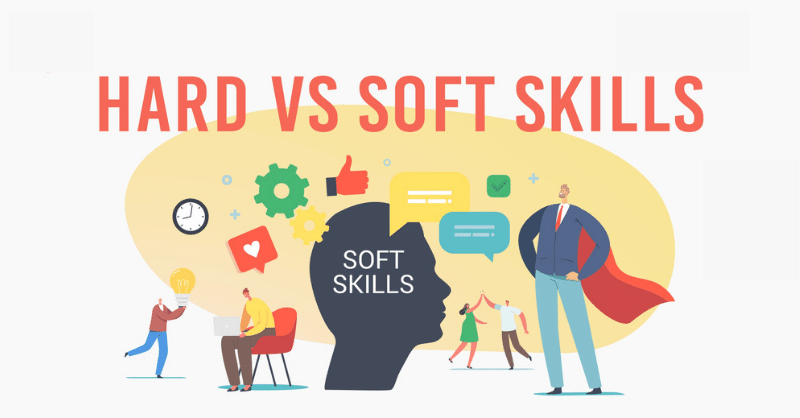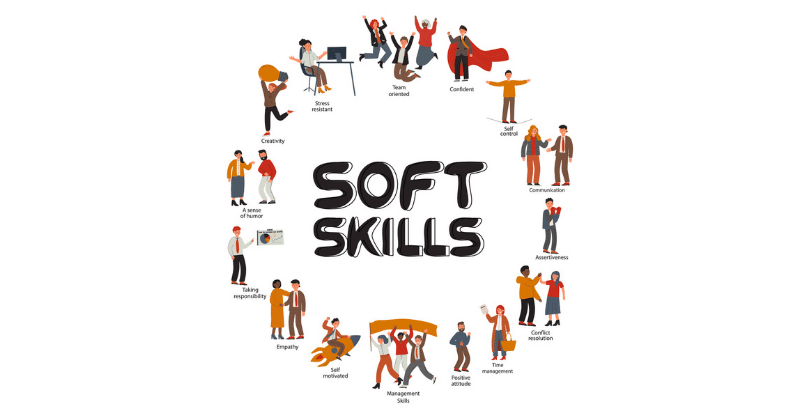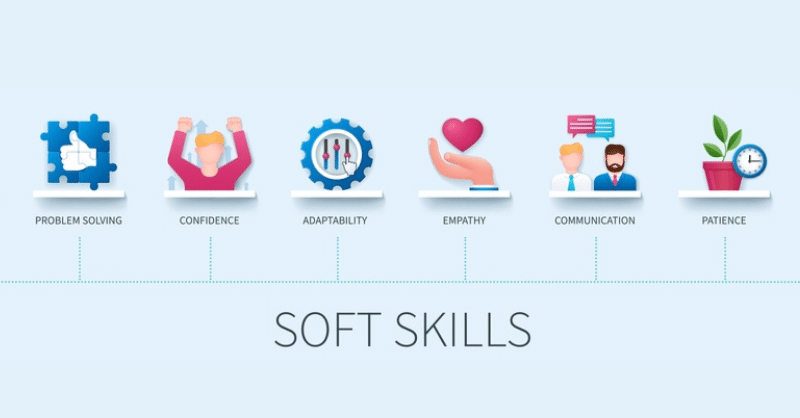
‘How to become a soft skills trainer?’ is a question we hear often in the training and development community.
Soft skills are the personality traits that help people to communicate and collaborate with others in a work environment. These skills play a significant role in employee performance. Employees with adequate soft skills tend to perform better than those without it. Hence, soft skill training is highly emphasised in almost every organisation.
So, there is good demand for soft skills trainers. However, many aspiring trainers are confused about how to become a soft skills trainer. Are you one of them? If yes, then this blog is exactly what you need.
In this blog, we will provide you with a guideline on how to become a soft skills trainer. It is the perfect place to clear out your confusion about how to start your career as a soft skills trainer. Stay tuned!
Table of Contents
What is Soft Skill Training?
Soft skills are the fundamental skills applicable to all professions. Soft skills include communication, teamwork, problem-solving, critical thinking, and more. Training designed to help people develop their soft skills is defined as soft skill training. Soft skills are not industry-specific like hard skills. They are mostly concerned with the behaviour and attitude of a person.
It is comparatively difficult to provide soft skill training. The reason is that soft skill training is about changing behaviour. It focuses on developing new thinking perspectives. Soft skill training helps professionals acquire the ability to work with a team. It boosts their communication skills and helps them grow personally and professionally.
What is the Difference Between Soft Skills and Hard Skills?
Before digging deep into soft skill training, let’s understand how it is different from hard skills.

The core differences between soft skills and hard skills are –
Soft Skills Hard Skills Soft skills can be applied in all areas. Hard skills are area-specific. Soft skills include interpersonal skills and personality traits. Hard skills are technical skills suitable for specific jobs. Soft skills are personal attributes, that’s why they are hard to prove. Individuals can prove their hard skills with certificates, awards and degrees. Soft skills are not measurable. Hard skills are measurable. Soft skills are assessed through behavioural interview questions and personality traits. Hard skills are assessed through CV, portfolios, or interview questions related to the role. Communication, critical thinking, and creativity are some examples of soft skills. Language skills, SEO marketing, coding, computer skills etc., are hard skills.
What are the Benefits of Soft Skill Training?
Soft skills training has excellent benefits for professionals working in any sector. Not just for the professionals, but also for the organisation. And soft skill training can bring positive impacts.
The advantages of soft skill training are explained below.
Improved Communication
Communication is one of the primary soft skills that support a person’s growth. But communication is not just conveying your message. It’s also about listening to others attentively to deliver the proper response. Besides, having the ability to communicate effectively helps to create a meaningful bond with the people around you.
Soft skill training helps the employees work on their communication skills. The trainer shows the learners how to interact with each other and create good relationships. It is also beneficial for interacting with the customers. For example, employees with good communication skills can provide better customer service.
Productivity
Soft skill training helps the employees improve their communication, leadership, team building, and critical thinking skills. Also, it supports individuals in developing a positive attitude. All these components contribute to increasing the productivity of a workforce. Therefore, soft skill training allows companies to boost their efficacy and perform better.
Better Teamwork

Employees with good teamwork skills are a blessing for any organisation. Soft skill training has proved to be very effective when it comes to teamwork.
This training allows the employees to develop a good relationships with other team members and reach the goal set for them. Soft skill training helps employees better understand each other. It also supports creativity and critical thinking. In addition, the training teaches how to cooperate with others, which is the primary fuel for a productive team.
Improved Critical Thinking and Creativity
Soft skill training allows individuals to enhance their creativity and critical thinking skills.
In soft skill training, the trainers teach techniques and strategies to help them think outside the box. Also, this training gives them the ability to devise effective solutions for each problem. And they learn how to think from different perspectives.
Satisfied Customers
Soft skill training help employees build good listening skills and problem-solving skills. Through this training, employees enhance their ability to show empathy and people skills. As a result, the employees become excellent at providing customer service. And they can understand the customer better and figure out what the customer needs. Also, soft skill training helps them in conveying empathy when the customer is worried.
In short, soft skill training helps in creating a satisfied customer base.
Increased Employee Retention
When organisations invest in soft skill training, they are investing in the employee’s professional development. This allows the employees to believe that the company values their hard work. Thus, the employees are satisfied with the organisation. And they feel motivated to work for its betterment. This prevents employees from leaving the job and becoming more loyal to the company.
Moreover, when companies provide soft skill training, the employees become more productive. And that reduces the need for new recruitment and saves the company valuable time and money.
Who is a Soft Skills Trainer?
A Soft skills trainer is a professional who guides and helps people develop their soft skills like communication, interpersonal, problem-solving, critical thinking etc. They assist individuals in improving their personal attributes and bringing out the best version of themselves.
Soft skills trainers can work under a company or training agency. Some soft skills trainer work on a contract basis for multiple companies. They can work independently as well. And there are many soft-skill trainers who provide online training.
What are the Responsibilities of a Soft Skills Trainer?
A soft skills trainer provides individuals training to improve their interpersonal skills. So, a soft skills trainer must fulfil many duties to support the individuals to enhance their soft skills.

Before learning how to become a soft skills trainer, you must know the responsibilities of a soft skills trainer.
For example, they are responsible for developing the learning materials for the training sessions. And after they are done planning the training materials, their next job is to evaluate the effectiveness of the materials.
Soft skills trainers are also responsible for motoring individuals and assessing their strengths and weakness. Then, the soft skills trainer adjusts the training according to their strengths and weaknesses.
The administrative duties also fall under the role of soft skills trainer. That means they have to take care of the administrative tasks as well as conduct training. For example, these administrative tasks can be billing, scheduling, coordinating etc.
How to Become a Soft Skills Trainer?
How to become a soft skills trainer? Like any other profession, you must follow a few steps to start your journey as a soft-skill trainer. Here is a list of the steps you must complete.
- Get a Degree
- Utilise Training Opportunities
- Prepare Your CV and Look for Job Openings
- Ace the Interview
- Work Independently
Get a Degree
The first step on ‘how to become a soft skills trainer’ is to complete your bachelor’s degree. The degree must be in a related subject like education, business, or communication.
If you are still in high school, finish your high school graduation or get an equivalent diploma. After that, choose the right college or university for yourself and complete your bachelor’s degree. However, if you are a step ahead, and you already have a bachelor’s degree, then it’s time for you to gather experience in this field.
Utilise Training Opportunities
Enriching your experience is an important step in becoming a soft skills trainer. An internship is an excellent opportunity to gain experience in this field. You can also do a part-time job while you complete your graduation or take up training courses to enhance your understanding.
There are many offline and online training opportunities available. You can join different training programs and improve your own soft skills. For example, you can take this Effective Communication Skills course by One Education. It will help you develop better communication skills. There are more courses like this in One Education, so join the one that will help you achieve your goals.
Prepare Your CV and Look for Job Openings
After you gather some experience, it’s time to create a CV that will attract the recruiter. Make sure you understand and properly use the keywords used on the job listing. Explain how taking you as a trainer can benefit their organisation. Tailor your application according to the requirement of each organisation. Make sure your resume represents all your skills and experience in this area.
After creating a CV representing your skills, it’s time to start looking for job openings. While you look for jobs, try to identify if there are any qualities that most companies look for. If you find any, try to relate them to your qualification and incorporate them into your CV. Other than searching for job openings online, you can also contact companies. And you can ask if they have vacancies.
Ace the Interview
The answer for ‘how to become a soft skills trainer’ comes down to your interview. Giving your best performance in the interview is the key to landing the job.
Make sure you showcase your soft skills properly. It will make the recruiter feel confident about recruiting you. To prepare yourself for the interviews, you can research the interview question. Also, you can carry out a mock interview with the help of a friend.
Make sure you maintain proper interview etiquette and portray confidence. Another helpful suggestion is to conduct a thorough research about the company you are interviewing for.
Here are 5 tips from a Harvard Career Advisor to help you ace your interview –
Work Independently
If you do not want to work for any organisation, then you can work independently. You can become a soft skill training contractor. Many soft skills trainers also provide online training. If you want, you can go on that path as well.
But, before you start your journey as an online trainer, make sure to do detailed research on it. In addition, make sure you are well-equipped with the technical tools and equipment for providing online training.
What Skills are Essential for Becoming
a Soft Skills Trainer?
Now that you know how to become a soft skills trainer, you need to work on your own skills. Without developing the right skills and abilities, you won’t be able to help others. So, the core skills you need to acquire are as follows –
Let’s explore them in detail.
Communication Skills
A soft skills trainer has to possess the skills they are supposed to help others acquire. Communication skill is one of them. A soft skills trainer needs to have the ability to communicate with each individual to conduct effective training. Communication skills will allow you to explain training materials and conduct successful training.
In addition, effective communication will help you expand your client base if you are working as an independent training conductor. Your communication technique will determine how many clients you receive.
Besides, you can learn more about different communication skills and how to acquire them from this blog – Different Types Of Communication Skills: Everything You Need To Know.
Organisational Skills
Organisational skills are a must for a soft skills trainer. This skill helps in planning the lessons and in the assessment process. Staying organised also gives them the time and ability to pay attention to each learner.
Also, soft skills trainers are responsible for administrative tasks, such as scheduling and coordinating. So, organisational skills help them keep everything on track and fulfil administrative duties successfully.

Critical Thinking
For designing and conducting training, a trainer needs to collect information. They also have to understand how to incorporate the information in the process. And this requires the trainer to think from different perspectives and relate to the trainees. That is why a soft skills trainer needs to have critical thinking ability.
Moreover, critical thinking ability allows them to develop and plan a curriculum to help conduct effective training.
Public Speaking
As a trainer, you have to speak in front of an audience regularly. Therefore, you need to have excellent public speaking skills.
If you are unable to provide a lecture or speech, you will not be able to meet the purpose. So, you have to develop the competence required for public speaking before you become a soft skills trainer. The more you can improve your public speaking skills, the better training you will provide to your learners.
Analytical Skills
Analytical skills are important for soft skills trainers. Because these skills allow them to identify patterns from feedback or critical data. This pattern may show if the lessons are working or not. According to the results, the trainer can adjust the training modules or change the training techniques.
Also, analytical skills help them understand the different requirements of different individuals or groups. Thus, it becomes easy to mould the lessons to fit diverse training needs.
Final Thoughts
Soft skill training is a challenging career. After you learn how to become a soft skills trainer and find yourself a training job, you must keep improving. The more you will work on yourself, the better trainer you will become.
Training courses can help you enrich your skills. You will find many valuable courses for your career development on One Education – a leading online learning platform. These courses will give you the chance to build new skills and improve the existing ones. What are you waiting for? Enrol now and kick-start your career!
Read More!


Challenging Behaviour in the Classroom [Types & Solution]

The Impact Of Remote Work On Women In The Marketing Industry

Differentiating Web Design and Web Development

Top 10 Social Media Management Tools for Businesses in 2024








 July 13, 2023
July 13, 2023








